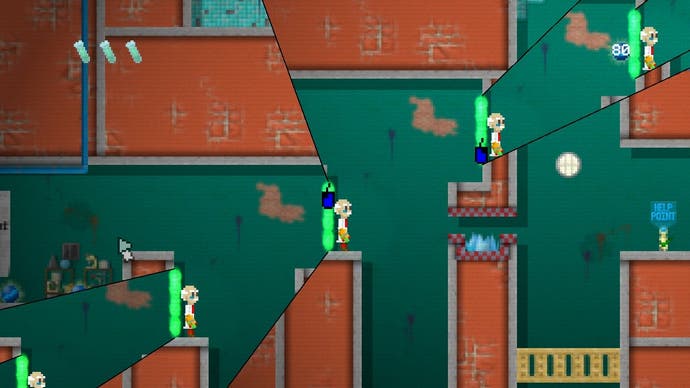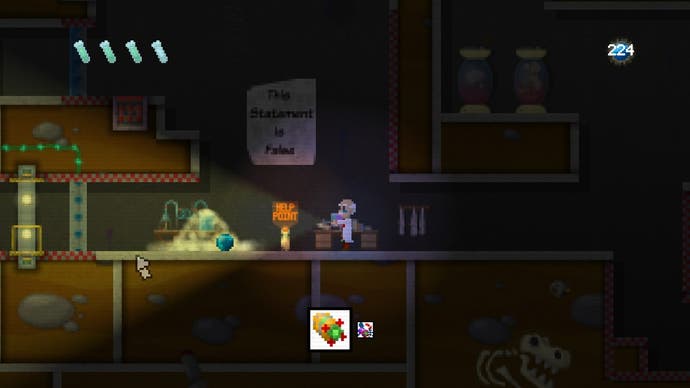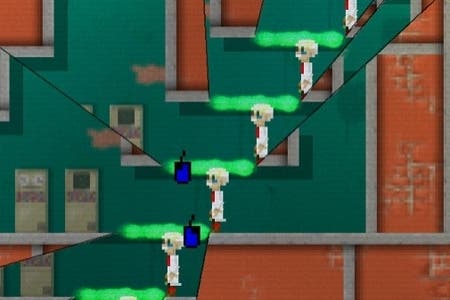Gateways review
I'm making a note here: MODERATE SUCCESS.
Gateways challenges you to navigate a cramped underground lab by manipulating time and space itself. Each click is a fold in the fabric of spacetime, meticulously crafting each origami solution. It is overwhelmingly inspired by Portal, as developer Smudged Cat Games (which also made The Adventures of Shuggy) is only too happy to admit.
And if you've played Portal, you'll know almost exactly what to expect from this £3 title available on Xbox Indie Games and PC, since it plays almost exactly like a £3 Portal. Just remove Portal's jokes and storytelling and swap in a sprawling, Metroidvania-style single environment with plenty of backtracking and you're there. A scientist wakes up in what's left of his lab, everything's scattered uselessly about the place, and your task is to steer your little Mario-alike to the surface.
In Portal (and Gateways) you're gifted with a gun that can create two "portals", or pathways, between two flat surfaces. Initially, this leads to you feeling sick as you see yourself through holes you shouldn't be able to see yourself through. This passes, at which point you have the framework for a fabulous puzzle game. How do you use portals to cross gaps? To jump high? To open doors?
It's similar to the appeal of Braid, Fez or World of Goo. These games present you with an intimidatingly powerful yet satisfying toy for manipulating your environment, then drop you before a series of increasingly taxing obstacles. Succeeding is fun, but so is developing vocabulary and fluency, so to speak, with the toy.
Gateways' opening hour is the closest parallel of Portal, and it's perfectly fine. The lack of a third dimension or any physics (or, indeed, cubes) hamstrings Gateways slightly, but it's still jolly to tumble through the game's environments.
Then you get your second gateway gun.
It's here that the game's vision and its potential begin rippling outwards from your avatar. The second gun creates two portals - but one's huge and one's tiny. Enter one, and you leave the other at a corresponding size. So, you can grow or shrink yourself.
What's mind-bending about this is that your avatar doesn't change size on the screen, but your environment all doubles or halves in size. The first time I saw this, I let out an animal groan of displeasure almost identical to when I stared down one of Portal's portals and saw my bum repeating forever. In other words, it's great fun. It's also the significant spin on Portal's ideas required not just to make it feel fresh again, but to make Gateways an evolution rather than just an homage.

But that's just the start. The third gateway gun you get is properly horrific: a portal that sends you back in time however many seconds you spent waiting before opening the second, "output" portal. So when you come out, and you'll see yourself doing whatever, then turning, opening the portal you entered, and entering it.
You can, incidentally, run into this first Portal after this echo of your past self, at which point you'll emerge from the output Portal a few steps after the first version of you did, resulting in three of you in a room together. Repeat this process over and over - as the game, mortifyingly, insists you do - and you can end up emerging from a portal into a room that resembles a nightmare house party full of yous.
Feel ill yet? We're not finished! The fourth and final gun you get is the rotation gun. Marginally more self-explanatory, this sees you exiting the second portal into the same world, except rotated in accordance to how you place the portals. Place one on the floor and one on the wall, the world rotates 45 degrees. Place both facing the same way, the floor becomes the ceiling.
All of which makes Gateways a stellar, well thought out puzzle gem on paper, and a tiny tragedy in practice.

The smallest of its three problems is that while the game flows nicely, with your character jogging and bouncing happily from chamber to chamber, it lacks what makes Metroidvania level design so exciting: the hard-won satisfaction of unlocking new environments and the fact that the world is itself a puzzle. Gateways features all the backtracking of Metroidvania, but it's only that - backtracking.
Second, you end up butting heads with everything after the basic portal gun. The rotation gun is unintuitive, the resizing gun is fiddly and the time portal gun is harder to use than actually travelling through time.
But third, most exactingly and also most importantly, the puzzles lack the expert touch that distinguishes a great puzzle game - the touch that leaves you in the perfect limbo of staring down the barrel of a problem. The touch that has you grinning like an idiot when you solve a problem, first at your own wit and then at the wit of the designer. The touch that loads you with dread and excitement in equal measure as you encounter an obstacle (the puzzle game equivalent of being excited when an action game spawns more enemies).
Mostly, Gateways' puzzles either have you immediately spotting the solution and having only to execute it, or missing some vital piece of information that would otherwise allow you to spot the solution. It's enjoyable, the game rarely frustrates (thanks to a pay-coins-to-reveal-solution option) and there are some neat puzzles in there, but mostly Gateways is the sum of its guns. Fortunately, they're great guns.
Altogether, Gateways is an "if only" game. If only you could combine the effects of the various portal guns. If only there was a story. If only the puzzles were sharper, or the portals were combined with the kind of acrobatic platforming of, say, Super Meat Boy.
But never mind my pining. As a small-scale project and a £3 game, Gateways is a tiny, tidy success. But as an experiment in aperture science, it might need a little more time in the test chamber.









